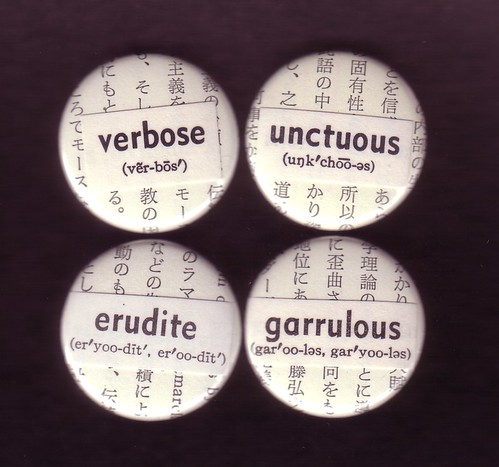There are those who suggest that the problems in the LCMS and, indeed, the Church at large, could be rectified by more statements or confessions to delineate, define, and address the issues at hand. At one point in time I wondered if the time had not come for another Formula of Concord for our own age. But I am less inclined the more I think about it.
I wonder if the problems are not made worse by more words. When it comes to words, the Church has no shortage of them. The LCMS has added a goodly share over the course of her own short existence of 163 years. I wonder if this has not created more problems for us than resolved any.
We have mountains of essays to conventions (District and Synodical). We have mountain ranges of resolutions offered, debated, and passed. We have molehills of statements -- both officially adopted (A Brief Statement, for example) and unofficially adopted (CTCR opinions). We have books upon books (both good ones that will endure and those for which we ought to mourn the passing of one more tree). We have journals and magazines, periodicals and newspapers, rags and blogs (this one included) and there is no end to the endless supply of words we can throw at every issue, problem, challenge, or need.
What this endless supply of words has not done is end a conflict or bring to resolution a dispute or clarified a murky issue. We often end up offering up more words to explain the way the previous words were understood, to clarify or adapt or change what we said when it seems that we said something wrong or something that could lead to a wrong conclusion.
I am not an enemy of words. Those who know me know that I love words and keep no shortage of them floating in my mind or cluttering up my desk. I am a collector of words (10,000 + books in my library, all the issues of all the journals I have subscribed to going back more than 30 years, computer files, paper files, and too darn many emails to find what I am looking for...). But I know that my affection for words has not necessarily resulted in clarity or a conclusion to the ongoing debate on various things.
The time has come to put a moratorium on the Church adopting more position papers or making resolutions or making statements. The time has come to sift through what we have and to see if we can come to the table around these basic and core confessions. Maybe we should start with the first basic document of our Lutheran identity and work through it together -- the Augustana. Maybe we need to start with fewer words more carefully considered and more faithfully followed than throwing more words at every issue that raises its head in the Church.
We adopt a resolution calling for close(d) communion and weekly Eucharist at nearly every Synodical Convention. Who is listening? We throw at theses after theses at the subject of worship, contemporary worship, liturgical worship, etc... Who is listening? I look at the ELCA and the inbox on my email subscription account and see how many social statements or political comments are made by their bishops (well, one, really the Presiding Bishop), and I wonder if anyone except the author has read them? Surely, more words have not clarified the sea of mud that is Washington, DC; how have they clarified things in churches?
So I vote for fewer official words and more attention to the ones we have already adopted. What do you think?

3 comments:
As long as we have issues and divisions and error and falsehood in our 'fellowship', we have a need to confess and speak against such things. Where there is a clear word from the Scriptures or the Confessions, we should speak that word clearly and boldly. Where there is not, then we speak by way of the analogy of faith, which is still bringing the Scriptures and Confessions to bear, but, which may require more or different words.
The issue, as you have hinted, is that those who need to hear are not listening, not willing to listen, and are instead quite happy to be doing what is right in their own eyes and are content and even obligated to do so, according to their (ill-formed?)-consciences until, or even once, they undergo appropriate supervision, which supervision is essentially completely lacking in the LC-MS. We'll see how and when that might change with the election of Rev. Harrison.
An issue equal with that is the willingness of so many who might otherwise be of an orthodox confession to ignore all the issues and divisions in synod as long as they are permitted to do what is right in their own congregation, since we have such an intensely autonomous and congregational polity. There are many pastors who are content to simply teach the thesis, and not the antithesis, and as long as their own congregation is not presented with issues that require such a teaching moment, then they don't bother airing any of vast amount of dirty laundry of the synod. However, this too is to the detriment of many, since there is thus little guarding of the flock.
I'm looking forward to what might become of the ACELC and its approach to our issues, errors, divisions, etc, which I see as compatible with Rev. Harrison's approach as outlined in his 'It's Time' paper. Whether it is compatible or not, I think they have a right and obligation to confess as they are.
Lord have mercy.
so many books and journal and... where do you find space for all that? i used to be a book fanatic, not anymore, but you... you...
Fr. Peters,
MAYBE if you actually went through your own emails and "sifted" them, then sent proof to Synod..... ;>D
Post a Comment